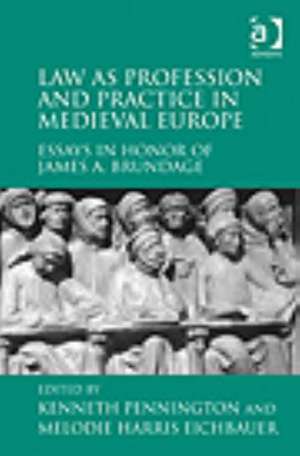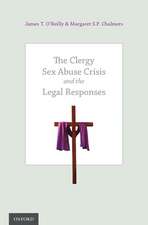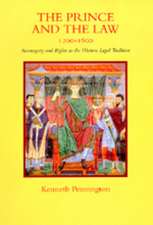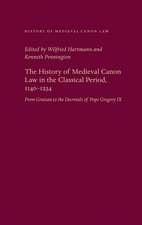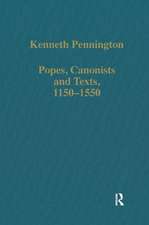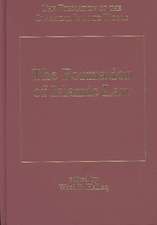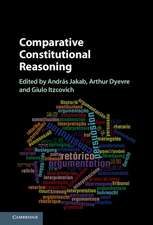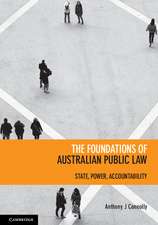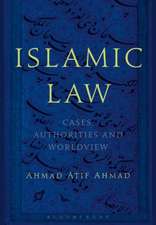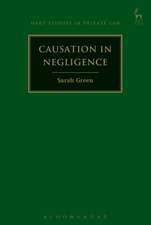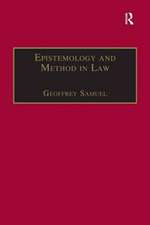Law as Profession and Practice in Medieval Europe: Essays in Honor of James A. Brundage
Editat de Kenneth Pennington, Melodie Harris Eichbaueren Limba Engleză Hardback – 19 oct 2011
Preț: 1054.71 lei
Preț vechi: 1286.24 lei
-18% Nou
Puncte Express: 1582
Preț estimativ în valută:
201.83€ • 212.23$ • 166.76£
201.83€ • 212.23$ • 166.76£
Carte tipărită la comandă
Livrare economică 16-30 aprilie
Preluare comenzi: 021 569.72.76
Specificații
ISBN-13: 9781409425748
ISBN-10: 1409425746
Pagini: 440
Dimensiuni: 156 x 234 x 25 mm
Greutate: 0.45 kg
Ediția:1
Editura: Taylor & Francis
Colecția Routledge
Locul publicării:Oxford, United Kingdom
ISBN-10: 1409425746
Pagini: 440
Dimensiuni: 156 x 234 x 25 mm
Greutate: 0.45 kg
Ediția:1
Editura: Taylor & Francis
Colecția Routledge
Locul publicării:Oxford, United Kingdom
Notă biografică
Kenneth Pennington is Kelly-Quinn Professor of Ecclesiastical and Legal History at The Catholic University of America, USA; Melodie Harris Eichbauer is Assistant Professor of Medieval History, History Department, Florida Gulf Coast University, Fort Myers, USA
Recenzii
'It is thus fitting that Brundage's career to date should be celebrated in this Festschrift, whose editors have assembled a magnificent team of top scholars... The reader wishing to broaden her knowledge of any of the topics - and to read recent work by the top scholars in the field - will find it worthwhile to spend time with this volume. The authors present the complex field of medieval canon law in a way that is accessible to a general audience, a fitting tribute to a scholar who has tried to make medieval canon law accessible to historians with little background in law, lawyers with little background in history, and even to undergraduates.' The Medieval Review 'What unites them all is the strength of the meticulous attention to sources by all the authors... There is, in short, something of interest in this volume for a wide variety of medieval historians and some early modernists as well, and not just those concerned with canon law or even law more generally. Brundage’s own work had an impact over that broad a spectrum of fields, so in that sense too this volume is an apt homage to him.' European History Quarterly
Cuprins
List of Figures, List of Abbreviations, Introduction, Part I. Medieval Legal Thought and Constitutional Ideas, 1. Bishops and Bankers, 2. Defending a Conservative View on Witches: Juan de Torquemada on c. Episcopi [C.26 q.5 c.12], 3. Pope Innocent III and Secular Law, 4. Corporatism, Individualism, and Consent: Locke and Premodern Thought, 5. The Rights of Self-Defence and Justified Warfare in the Writings of the Twelfth- and Thirteenth-Century Canonists, 6. Feudal Oath of Fidelity and Homage, 7. Is the Sea Open or Closed? The Grotius-Selden Debate Renewed, Part II. Schools, the English Church, and Texts, 8. The Sacred Muses and the Twelve Tables: Legal Education and Practice, Latin Philology and Rhetoric, and Roman History, 9. When Did Cambridge Become a Studium generale?, 10. Regulating the Number of Proctors in the English Ecclesiastical Courts: Evidence from an Early Tudor Tract, 11. Collectio Fontanensis: A Decretal Collection of the Twelfth Century for an English Cistercian Abbey, 12. “Deus est procurator fatuorum”: Cloistered Nuns and Equitable Decision-Making in the Court of Chancery, 13. Canon Law as Reflected in the Ecclesiastical History of Orderic Vitalis, 14. Pro Amore Dei: Diplomatic Evidence of Social Conflict During the Reign of King John, Part III. Law, Sex and Marriage, 15. The Mysterious Canonist Bazianus on Marriage, 16. Charlemagne in Hell, 17. Sex and the Romanesque in Occitania-Provence, Part IV.?Law and Crusades, 18. The Templars and Their Legislation, 19. Adhemar of Le Puy, Papal Legate on the First Crusade, Bibliography of James A. Brundage’s Published Works, Index
Descriere
This volume brings together a set of papers by international scholars, distinguished in their own right, in honor of James Brundage. Each contribution corresponds to an important focus of Brundage's own work. The connection between the development of medieval legal thought and constitutional ideas is the theme that marks the first section, while the second centres on the growth of the legal profession. The following papers explore the intersection of law and marriage and finally the influence of legal thinking on the crusading movement.
